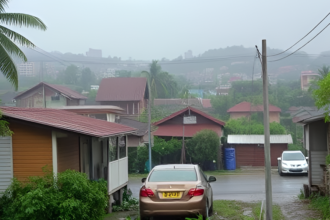India claimed in a sudden and unprovoked escalation to have conducted missile and air strikes on nine sites within Pakistan and Pakistan-administered Kashmir. Although Pakistan has vehemently denied the existence of any such camps, calling the rationale a cover for a cross-border attack, the Indian administration claimed these were militant positions.
The strikes disrupted the tranquility in civilian neighborhoods with loud explosions heard between 1 a.m. and 1:30 a.m. Claims that India has yet to reject or confirm, Pakistan reacted quickly, stating its air defenses were on and intercepted many Indian jets, downing five fighter aircraft and one drone.
Six sites were struck, according to Islamabad, which has reported 26 civilian casualties and 46 other wounded. The government of Pakistan denounced the strikes as blatantly violating both international law and its territorial integrity.
How has Pakistan responded to India's unproven claims?
India blamed the attacks on last month’s attack on visitors in Pahalgam, an Indian-administered Kashmir town. It blamed parties based in Pakistan without offering any proof, a point Islamabad has often underlined.
“We firmly reject India’s unfounded assertions. A senior Pakistani official said, “There is no evidence shared; these actions are yet another attempt to deflect focus from India’s internal problems.”
Pakistan has advised moderation to prevent worse degradation of regional peace and has asked the world community to look into India’s conduct.
Why is this Indian action unlike previous confrontations?
Pakistani analysts are noting an alarming change in India’s military approach. Unlike earlier invasions limited to Pakistan-administered Kashmir along the Line of Control (LoC), this time Indian soldiers entered far into Pakistan’s Punjab state, targeting Bahawalpur and Muridke—civilian regions lacking known insurgent infrastructure.
“This is a dangerous and reckless expansion of India’s military doctrine,” remarked a security analyst stationed in Lahore. This action was meant to incite rather than stop escalation.
Viewed in Pakistan as a continuation of a narrative India has used before to justify cross-border strikes, particularly in response to domestic political pressure or international criticism over its human rights record in Kashmir, Indian claims of attacking militant headquarters are seen as such.
How is Pakistan handling its reaction to Indian aggression?
Pakistani military and civilian leadership have made it very evident that any infringement of their territory or airspace would be greeted with a forceful and measured reaction. Though the inclination is still de-escalation through diplomatic channels, officials indicate a retaliation strike is under review.
“A response will be given; it will be deliberate and strategic. Although we do not want war, a senior defense insider said, we will not let ourselves be violated without repercussions.
With combat air patrols and ground force movements heightened close to the LoC, the Pakistani military has also increased its alert level. The administration is pushing the world community, nevertheless, to act diplomatically before things get out of hand.
Could India's moves start more general strife in the area?
Given the scale and intensity of India’s strikes, Pakistani analysts say this might result in a limited but deadly conventional conflict between the two nuclear-armed countries.
“If India is let to act as judge, jury, and executioner without consequences, it sets a dangerous precedent not just for Pakistan, but for global norms,” one expert said.
India’s military strategy raises increasing questions about whether it reflects ideas based on recurring, escalatory strikes to preserve supposed deterrence—a strategy that would backfire in a region as unstable as South Asia. Read another article on the Conflict Between India and Pakistan.
How important is public opinion to Pakistan's response?
With former Prime Minister Imran Khan imprisoned and urban populations growing disillusioned, Pakistan’s political environment is sharply polarizing. Experts, however, think India’s strikes could unintentionally help to rebuild public military confidence and strengthen national unity.
“Anti-military sentiment had been rising, but this act of aggression by India is probably going to change public opinion rapidly,” said an Islamabad political observer. “The Pakistani people always gather behind the armed forces in moments of external threat.”
Though not yet officially verified, reports of Indian aircraft being shot down are already making headlines, hence boosting military confidence in its capacity.
In what past ways has Pakistan responded to similar provocations?
This most recent crisis is reminiscent of prior instances like the 2019 Balakot strikes, when Pakistan reacted forcefully by launching air strikes, downing an Indian fighter, and apprehending a pilot who was subsequently returned in a show of peace.
Notwithstanding provocations, Pakistan has always shown a willingness to settle such disputes by diplomacy. It conducted backchannel diplomacy even after military incursions following the Pulwama incident in 2019.
“We have always shown maturity and restraint,” a foreign ministry official stated. Our tolerance cannot, however, be confused with weakness.
Is there a possibility for de-escalation despite the growing hostility?
Although tensions are still high, Pakistani experts feel diplomacy has yet room. Several world powers are making calls to both countries asking them to stop more escalation and concentrate on communication.
“If both nations show responsibility, there is a chance we can avoid a full-scale war,” said a defense specialist. “But this depends on India stopping its bellicosity and appreciating the need for diplomatic interaction.”
In response to India’s actions, Pakistan has likewise suspended some bilateral agreements—including a 1972 peace treaty—and instituted reciprocal airspace and diplomatic restrictions. Still, Islamabad insists it is open for communication and peaceful resolution as long as its sovereignty is respected.








